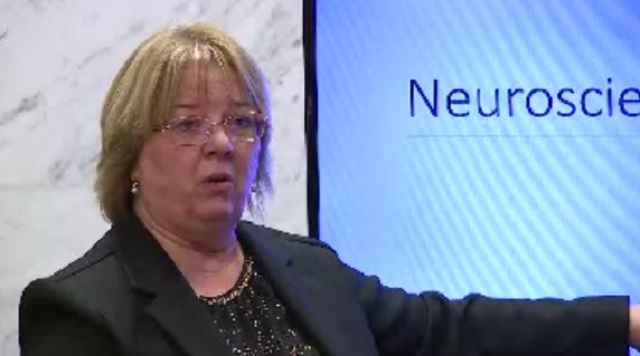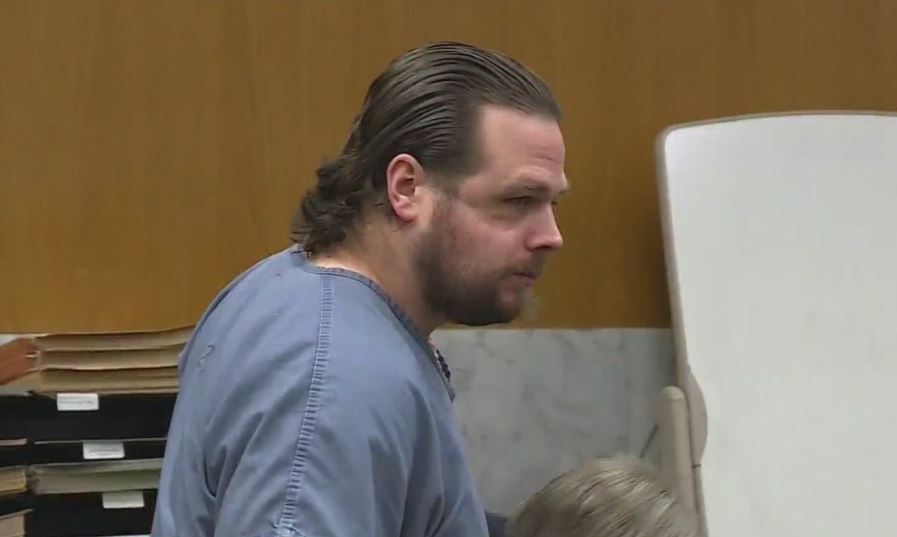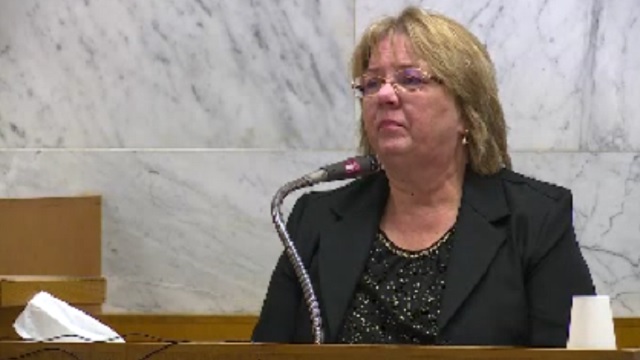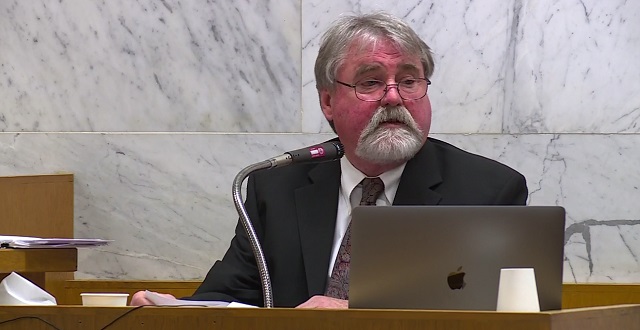PORTLAND, Ore. (KOIN) — Psychologists took the stand and testified all of Tuesday in the MAX attack murder trial of Jeremy Christian.
Christian, 37, is accused of killing Ricky Best and Taliesin Namkai-Meche and critically wounding Micah Fletcher on the Green Line train as it arrived at the Hollywood Transit Center.
The first, clinical psychologist Dr. Glena Andrews, spoke in detail about Christian’s educational background, family life and cognitive abilities. The second, Dr. Timothy Derning, spoke at length about Christian’s autism, dysfunctional family, lack of friends and how prison changed him.
Both psychologists examined Christian since the MAX attack and were called by the defense.
Brain ‘deficits are broader‘
Dr. Glena Andrews testified Tuesday that Jeremy Christian’s brain “deficits are broader” than what would have been caused by a gunshot to the face.
Andrews, the Director of Clinical Training at George Fox University, said she met with him three times and delivered several batteries of tests. She also reviewed reports from other doctors, police reports, and asked him questions about his background.

Christian told her his brothers struggled with school. He told her he thought he completed 9th grade, then finished his GED while in detention. Andrews said Christian spent time in solitary confinement during his previous incarceration and told her he enjoyed being away from people.
“People who struggle to understand people around them and the world around them and can get overwhelmed easily often do prefer to be alone,” she said.
She said Christian lived with his father at one point, his mother at another, and had also been homeless. She was not sure if he ever had a residence of his own. She noted he appeared to use the sale of comic books as a way to engage with other people.
In 2002, Christian was shot in the cheek by a Portland police officer after an armed robbery at Ed’s Market, located in the Kenton Neighborhood just south of Farragut City Park. He pleaded guilty 6 months later to robbery and kidnapping.
Andrews did not reach the conclusion that Christian’s gunshot wound to the face caused any brain damage. Based on her tests, she believes “his deficits are broader” than just what a gunshot would have caused.

The tests are similar to visual puzzles or memory games. Andrews said the tests evaluate executive function which involves brain connectivity and the ability to make decisions. Overall, Christian scored in the average range. However, looking at the subtests, Andrews said there are areas where Christian was at a deficit.
Andrews said Christian doesn’t remember details as well as some people and has an impaired ability to observe and pay attention to surroundings. He demonstrated a tendency to pick one method of solving a problem, and then stick with it, even if it wasn’t working or the rules changed. He also struggled to see things from other peoples’ perspectives.
When put in context of the incident on the MAX, Andrews said there is a lot of stimuli even on a normal train. When Fletcher pushed Christian down, she said anyone’s nervous system would be activated, and with a brain that is not fully comprehending the environment, Christian’s vision would have been very singular.
Regarding the ranting seen after the incident, Andrews seemed unsurprised, noting that “those kinds of statements” were the ones that would most readily be part of his verbal process.
Cross examination
During cross examination, prosecutor Jeffrey Howes brought up the fact Christian had been threatening to stab people on the MAX platform the night before, about 16 hours before the incident on the train.
Howes argued that action, coupled with Christian’s continued threats after the stabbing, suggested he was aware of what was going on.
Howes asked Andrews multiple questions about how the tests she administered are conducted, other options neuropsychologists have, what percentile of each test and subtest Christian fell into, and so on.
Howes’ questions got more aggressive. He asked Andrews pointedly if she really thought everything in this trial happened in 10-12 seconds. In earlier testimony, defense attorneys had asked Andrews if 11 seconds was enough time for Christian to make important decisions. She answered no.

The defense objected to Howes’ question and Judge Albrecht sustained the objection. The defense again objected after Howes tried to get Andrews to say the events on May 25 — the night before the MAX attack — were aggravating (she said it was activating). Judge Albrecht sustained the objection again and Howes resumed asking very specific questions about the tests/subtests for about 20 minutes.
Questioning once again became more aggressive.
Howes noted Christian got his GED at 16, attended community college for some time, and held down a job at a pizza place for a few years. He also said Christian had been in numerous physical fights over the years.
He then brought it back to the 10-12 seconds of the MAX attack stabbing. Howes said that Christian, in Andrews’ professional opinion, is capable of making a plan.
Andrews answered, “He can make his plan.”
Howes asked if Christian can plan to go to the grocery store. Andrews said she didn’t assess that task, but she would guess he could. Howes also said Christian and got to school, hold down a job, that Christian was able to make a plan to sell comic books outside of Powell’s at one point.
So, Howes asked, even though Christian said the night before the MAX attack, “Get away or I’ll stab you,” even though he pulled a knife from his pocket, it’s still your testimony that he couldn’t plan?
Andrews said it was.
In redirection, defense attorney Greg Scholl noted Christian’s fullscale IQ score in the 90s may not be fully reflective of cognitive deficits. Scholl said that a person like Albert Einstein might have an IQ of 160, but still can’t drive a car.
Andrews agreed.
‘Doesn’t really have any friends’
Dr. Timothy Derning, a forensic psychologist, said he focuses more on the legal aspects of mental health. Over 3 days in November 2018 he administered a series of tests to Christian.
“I would say he’s autistic, he has these autistic traits, he’s got a very complicated and difficult history. His family was very dysfunctional,” he said.

Christian’s parents, who divorced in the late 1980s, weren’t helpful, Derning said. Christian’s mother seemed not to want any blame for the incident and he found Christian’s father to be a “very peculiar man” when they met and noted that the father comes across as autistic himself.
His “father doesn’t really seem to know him” to the point when, at one time, he didn’t even know his son’s date of birth.
Derning mentioned Christian’s alcohol and drug use, trouble getting gainful employment, and lack of friends.
“He really doesn’t have friends,” Derning testified. He has Facebook friends, he had acquaintances.
Jeremy Christian went to prison around the age of 19. Derning said that’s a significant developmental milestone, when people are becoming young adults and establishing independence. Instead, Derning said, “all of that was taken from him” and he was put in a violent, difficult setting.
When asked if Christian is a “typical” individual, Derning said no.
Derning said Christian didn’t have a history of juvenile arrests and didn’t appear to be a “bully or a fighter.” But “he sure could fight in prison and when he came out.”
Christian came out of prison a very “damaged” person, Derning testified.
Multiple times throughout his testimony, Derning stated Christian did not affiliate with any groups. In prison, he said Christian didn’t join any gangs and saw himself as a non-joiner. Later, Derning said Christian told him in this whole Fascist vs. Antifa fight, Christian declared he wasn’t on either side and hated both groups.
Cross-examination
Prosecutor Don Rees immediately took aim at Derning’s credentials. The doctor earlier said he testified in numerous federal and state cases.
In a testy exchange, Rees wondered which side requested Derning’s testimony in these cases.
“It’s the defense’s request.”

“Ever at the request of police departments?”
“Well they wouldn’t be the ones to call me.”
“What about District Attorney’s offices?”
“Um, no. I wish they would but they don’t.”
“Hmm. I wonder why.”
The defense objected to the last comment by Rees. Judge Albrecht sustained the objection.
Rees then focused on Christian’s academic background — he wasn’t held back in school, had a decent IQ, and while at PCC he got As and Bs. He noted Christian sold comic books and even told his mom — while he was in jail — about which ones to sell. Rees compared Christian to a businessman.
He then got Derning to confirm earlier testimony: Jeremy liked to ride buses in the most dangerous parts of town, making himself seem like a victim to then “kick some bullies’ ass”; that Christian planned the armed robbery, bought a gun, loaded it, got handcuffs, wore gloves and a mask and robbed a convenience store all because the store’s owner accused him of shoplifting months before; and asked again about Christian’s autism.
Derning agreed that usually a child’s mother will identify autism in a child. But, Derning said, Jeremy Christian was the third child in a dysfunctional family.
Speaking very slowly, Rees said, “The fact is in this case, Jeremy Christian’s mother told you she never had a concern about this.”
“Yes,” Derning said.
Derning’s testimony will resume Wednesday morning.
THE CHARGES AND THE TRIAL
The trial started January 28 at the Multnomah County Courthouse. Witnesses have provided painful first-hand accounts of what happened on the Green Line train at the Hollywood Transit Center on May 26, 2017.
Jeremy Christian has pleaded not guilty to 12 charges: two counts of first-degree murder, one count of first-degree attempted murder, one count of first-degree assault, one count of second-degree assault, three counts of second-degree intimidation, two counts of unlawful use of a weapon and two counts of menacing.
Digital reporter Hannah Ray Lambert covers the Jeremy Christian trial for KOIN 6 News and KOIN.com. Follow her on Twitter for a constantly-updated, minute-by-minute breakdown of the testimony.
Complete KOIN Coverage: The MAX Attack Trial
KOIN 6 News will be in the courtroom each day
and provide updates throughout the case